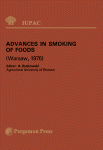Browse content
Table of contents
Actions for selected chapters
- Full text access
- Book chapterAbstract only
THE PHENOMENA OF QUALITY IN THE SMOKE CURING PROCESS
Damazy Jerzy Tilgner
Pages 1629-1638 - Book chapterAbstract only
PHYSICAL AND CHEMICAL PROCESSES INVOLVED IN THE PRODUCTION AND APPLICATION OF SMOKE
J. Rusz and K.B.M. Miler
Pages 1639-1654 - Book chapterAbstract only
ANALYSIS OF SMOKE AND SMOKED FOODS
Reiner Hamm
Pages 1655-1666 - Book chapterNo access
CONTRIBUTION OF SMOKE COMPOUNDS TO SENSORY, BACTERIOSTATIC AND ANTIOXIDATIVE EFFECTS IN SMOKED FOODS
Nina Baryłko-Pikielna
Pages 1667-1671 - Book chapterAbstract only
SOME FACTS AND LEGISLATION CONCERNING POLYCYCLIC AROMATIC HYDROCARBONS IN SMOKED FOODS
E.A. Walker
Pages 1673-1686 - Book chapterAbstract only
NOVEL CONCEPTS IN TECHNOLOGY AND DESIGN OF MACHINERY FOR PRODUCTION AND APPLICATION OF SMOKE IN THE FOOD INDUSTRY
C.M. Hollenbeck
Pages 1687-1702
About the book
Description
Advances in Smoking of Foods covers the plenary lectures presented at the International Symposium on Advances in Smoking of Foods, held in Warsaw, Poland, on September 8-10, 1976. The book focuses on the processes involved in the smoke curing of foods, as well as on the analysis of the production of smoke and compounds found in it.
The compilation first offers information on the phenomena of quality in the smoke curing process, including the history, reviews, and advances of the process. The book then evaluates the physical and chemical processes involved in the production and application of smoke. The processes considered in the production of smoke from wooden materials are underscored.
The text presents an analysis of smoke and smoked food, wherein it is posed that wood smoke is composed of compounds formed by the pyrolysis of wood constituents such as cellulose, hemicellulose, and lignin. Polycyclic hydrocarbons and phenolic compounds are discussed. The book also explains the contributions of smoke compounds to sensory, bacteriostatic, and antioxidative effects in smoked foods; facts and legislation regarding polycyclic aromatic hydrocarbons in smoked foods; and concepts in technology and design of machinery for production and application of smoke in the food industry.
The selection is a vital source of information for readers wanting to study the smoke curing of foods.
Advances in Smoking of Foods covers the plenary lectures presented at the International Symposium on Advances in Smoking of Foods, held in Warsaw, Poland, on September 8-10, 1976. The book focuses on the processes involved in the smoke curing of foods, as well as on the analysis of the production of smoke and compounds found in it.
The compilation first offers information on the phenomena of quality in the smoke curing process, including the history, reviews, and advances of the process. The book then evaluates the physical and chemical processes involved in the production and application of smoke. The processes considered in the production of smoke from wooden materials are underscored.
The text presents an analysis of smoke and smoked food, wherein it is posed that wood smoke is composed of compounds formed by the pyrolysis of wood constituents such as cellulose, hemicellulose, and lignin. Polycyclic hydrocarbons and phenolic compounds are discussed. The book also explains the contributions of smoke compounds to sensory, bacteriostatic, and antioxidative effects in smoked foods; facts and legislation regarding polycyclic aromatic hydrocarbons in smoked foods; and concepts in technology and design of machinery for production and application of smoke in the food industry.
The selection is a vital source of information for readers wanting to study the smoke curing of foods.
Details
ISBN
978-0-08-022002-4
Language
English
Published
1978
Copyright
Copyright © 1978 Elsevier Ltd. All rights reserved.
Imprint
Pergamon
